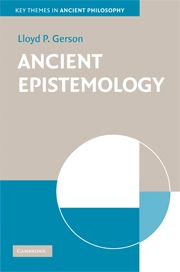Book contents
1 - Ancient and modern perspectives
Published online by Cambridge University Press: 05 June 2012
Summary
A book on ancient epistemology is sure to face the suspicion that its subject is only of antiquarian interest. What, after all, could ancient epistemologists teach modern practitioners in the field? The prospects for a positive answer to this question might, to the untutored eye, seem to dim further when we realise that ancient epistemology is a form of naturalism, that is, an account of cognition in general rooted in an understanding of the natural world to which humans belong and also from which they somehow stand apart as observers or thinkers. Reasonably enough, one might suppose that an antiquated view of nature would inevitably produce a view of human knowledge destined to be antiquated as well. The viability of ancient epistemology will depend on how persuaded we are that epistemology ought to be assimilated to natural science. Modern philosophers are divided over this question. It would, however, be a mistake to try to make a case for the continuing relevance of ancient epistemology by treating it as a forerunner of contemporary non-naturalism, roughly, the view that epistemology is largely a matter of logic and semantics and not a legitimate branch of natural science. In fact, ancient epistemology is not accurately represented either as an obsolete or inchoate version of modern naturalism or as a version of the non-natural ‘criteriological’ approach. It constitutes a third approach.
- Type
- Chapter
- Information
- Ancient Epistemology , pp. 1 - 13Publisher: Cambridge University PressPrint publication year: 2009



